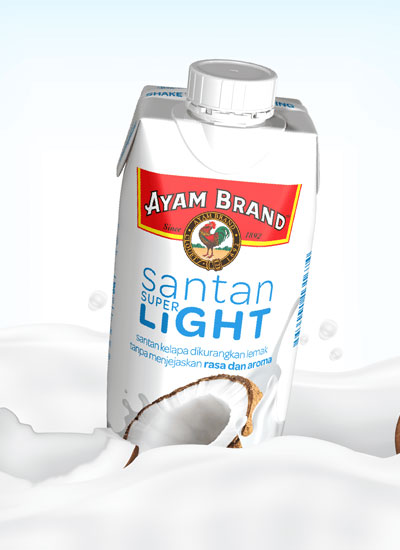 THE BEST NATURAL SOURCE OF MCFA (MCT)
THE BEST NATURAL SOURCE OF MCFA (MCT)
Extracts from the book "FOOD FOR THE BRAIN, by Prof. Shirasawa, PHD, MD, anti-aging specialist. ISBN 978-967-14205-0-8"
It is significant to know that coconut fat is mostly saturated medium-chain fatty acids (MCFAs), also called medium chain triglycerides (MCTs). MCFAs are notable for being easily digestible and have a greater solubility in water.
MCFAs are used to produce energy, not body fat and not arterial plague.
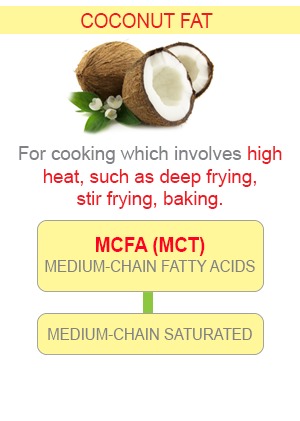 To understand what makes coconut fat most remarkable even with its traditionally miraculous history, is to understand its properties and how the body responds to it.
To understand what makes coconut fat most remarkable even with its traditionally miraculous history, is to understand its properties and how the body responds to it.
All fats and oils are composed of fat molecules known as fatty acids. There are two methods of classifying fatty acids. First is based on saturation, where you have saturated fats, monounsaturated fats and polyunsaturated fats.
The second method of classification is based on molecular size or the length of the carbon chain within the fatty acid. You have short-chain fatty acids (SCFAs), medium-chain fatty acids (MCFAs), and long-chain fatty acids (LCFAs). When three fatty acids are joined together by a glycol molecule you have a triglyceride. So you can also have short-chain triglycerides (SCTs), medium-chain triglycerides (MCTs), and long-chain triglycerides (LCTs). Sometimes people use the terms fatty acid and triglyceride interchangeably.
It is significant to know that coconut fat is mostly saturated medium-chain fatty acids (MCFAs),
also called medium chain triglycerides (MCTs).
MCFAs are notable for being easily digestible and have a greater solubility in water.
In comparison to the vast majority of other fats in our diet: soybean oil, corn oil, canola oil, olive oil and chicken fats, which are composed entirely of LCFAs. Some 98 to 100% of the fat you eat each day consists of LCFAs. This type of fat requires pancreatic digestive enzymes and bile for digestion. While the MCFAs in coconut fat can provide a quick and easy source of nutrition without taxing the enzyme systems of the body.
LCFAs are absorbed into the intestinal wall and combined with cholesterol and proteins to form triglyceride-rich lipoproteins called chylomicrons that are released into the bloodstream and are eventually transformed into low-density lipoproteins (LDL). LCFAs are circulated throughout the body as a component of lipoproteins.
In contrast, MCFAs are transported across the intestinal wall and into the portal vein where they are sent directly to the liver. In the liver, MCFAs are used to produce energy in the form of ketone bodies. Therefore, MCFAs bypass the lipoprotein stage in the intestinal wall and in the liver. They do not circulate in the bloodstream to the degree that other fats do. They are used to produce energy, not body fat and not arterial plaque.
MCFAs rapidly metabolised into energy in the liver. It is thought that unlike other saturated fats. The shortcuts that MCFAs take through our digestive system means that it is able to fight diseases, especially inflammatory conditions.
GOOD FATS FOR COOKING

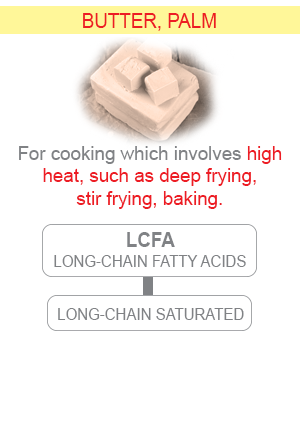
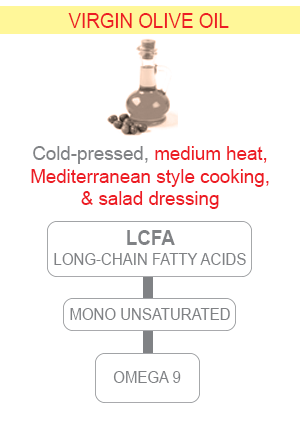
GOOD FATS FOR SUPPLEMENT
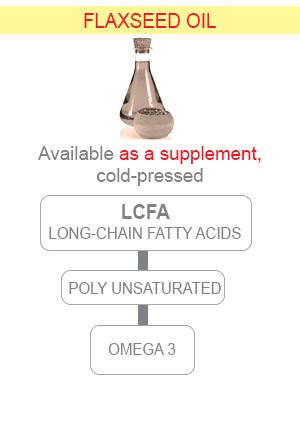
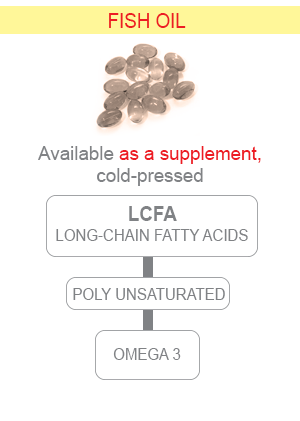
NEED TO REDUCE GREATLY
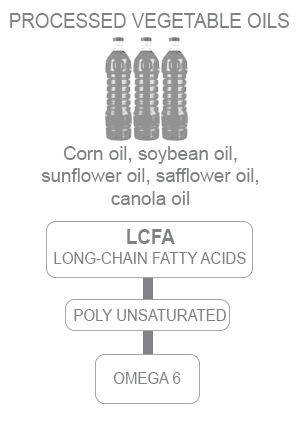
"All above text are direct quotes from Prof. Shirasawa book and they are presented here for information about the latest findings about coconut benefits. These information can not be seen as a recommendation to modify or alter a medical treatment. Like any other good food ingredient, coconut can bring benefits only within a proper balanced diet and regular physical exercises."
Reference: FOOD FOR THE BRAIN - PROF. SHIRASAWA’S READINGS
 HOW COCONUT OIL COULD HELP FIGHTING SOME DISEASES
HOW COCONUT OIL COULD HELP FIGHTING SOME DISEASES
Extracts from the book "FOOD FOR THE BRAIN, by Prof. Shirasawa, PHD, MD, anti-aging specialist. ISBN 978-967-14205-0-8"
 Inflammation, characterised by various white cells attracted to a site of infection or derangement, is the body’s mechanism for defence or for readjustment and healing. When successful, the inflammation disappears by itself. But when unsuccessful, the inflammation persists, becomes chronic, and eventually becomes the disease itself, producing further symptoms and complications.
Inflammation, characterised by various white cells attracted to a site of infection or derangement, is the body’s mechanism for defence or for readjustment and healing. When successful, the inflammation disappears by itself. But when unsuccessful, the inflammation persists, becomes chronic, and eventually becomes the disease itself, producing further symptoms and complications.
So we go back to doctor “Nature” for help.
Here is the coconut tree and its fruit, the water, proteins and oils from its fruit, where Nature appears to have created a defensive arsenal for us. Here are growth factors, anti-inflammatory factors, regulatory factors ready of our use. There is now evidence for instance, that coconut oil inhibits or down-regulate pro-inflammatory cytokines (like IL-1, IL-6, IL-8) and stimulates or up-regulates anti-inflammatory cytokines (like IL-10).
This little finding gives us a peek into why coconut oil can benefit such an unbelievably wide range of disease conditions.
Virgin coconut oil is different from other cooking oils in that its mediumchain fatty acids
contains caprylic acid, capric acid, and lauric acid - all good compounds that are beneficial to our health.
Monolaurin (also known as glycerol monolaurate) is a natural compound found in coconut oil and is known for its protective biological activities as an antimicrobial agent against Candida albicans. It was demonstrated by Dr. Murata et al that monolaurin has potential antifungal activity against C.
albicans and can modulate the host’s pro-inflammatory response.9
9 Chen, E., Seleem, D., Benso, B., Pardi, V., Murata, R. M. (2016) In vitro evaluation of
antimicrobial activity of 1-lauroyl-rac-glycerol on Candidaalbicans biofilms. Retrieved from https://doi.org/10.7287/peerj.preprints.1717v1
"All above text are direct quotes from Prof. Shirasawa book and they are presented here for information about the latest findings about coconut benefits. These information can not be seen as a recommendation to modify or alter a medical treatment. Like any other good food ingredient, coconut can bring benefits only within a proper balanced diet and regular physical exercises."
Reference: FOOD FOR THE BRAIN - PROF. SHIRASAWA’S READINGS
 THE BENEFITS OF COCONUT MILK
THE BENEFITS OF COCONUT MILK
Extracts from the book "FOOD FOR THE BRAIN, by Prof. Shirasawa, PHD, MD, anti-aging specialist. ISBN 978-967-14205-0-8"
The benefits of consuming coconut milk are similar to coconut oil, if not better.
Lauric acid, one of the components of coconut milk, is converted in the body into a highly beneficial antiviral and antibacterial compound in the body called monolaurin. This helps destroy a wide variety of disease causing organisms. Hence, it is believed that the consumption of coconut milk may help protect the body from infections and viruses.
Also, coconut milk does not contain lactose. So it is a good substitute for milk for the lactose intolerant,
while being highly and naturally nutritious, rich in fibre, vitamins C, E, B1, B3, B5 and B6
and minerals including iron, selenium, sodium, calcium, magnesium and phosphorous.
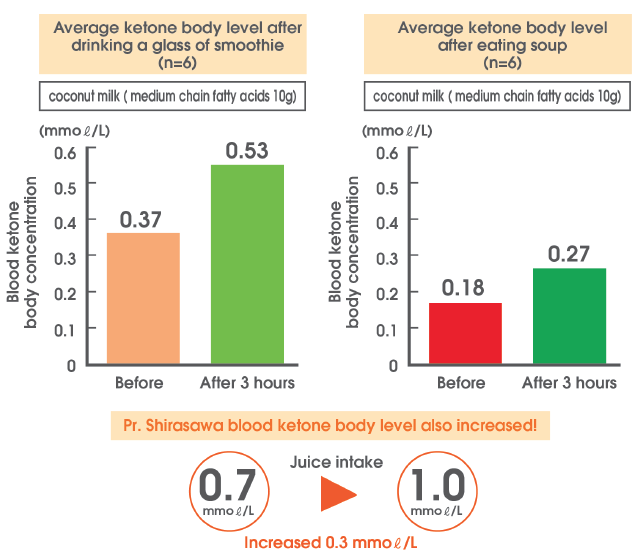 In one of my research on coconut milk in Japan, I conducted a study on the effects of coconut milk on the body’s ketone levels. This study included 12 volunteers, divided into two groups, where I first measured everyone’s ketone levels on an empty stomach.
In one of my research on coconut milk in Japan, I conducted a study on the effects of coconut milk on the body’s ketone levels. This study included 12 volunteers, divided into two groups, where I first measured everyone’s ketone levels on an empty stomach.One group of six volunteers consumed a carrot smoothie with coconut milk, while the other six consumed an oyster soup made with coconut milk.
I made sure both recipes had 66g of coconut milk, which translated into 10g of medium chain fatty acids (MCFAs). After 3 hours, I measured their ketone levels again. As in Figure 3, the left side is the carrot smoothie; while the right side is the oyster soup. The orange column is the level of the ketone bodies on an empty stomach, the green column is the level 3 hours after consumption of the coconut milk. In both groups, I could confirm that the levels went up after ingesting coconut milk.
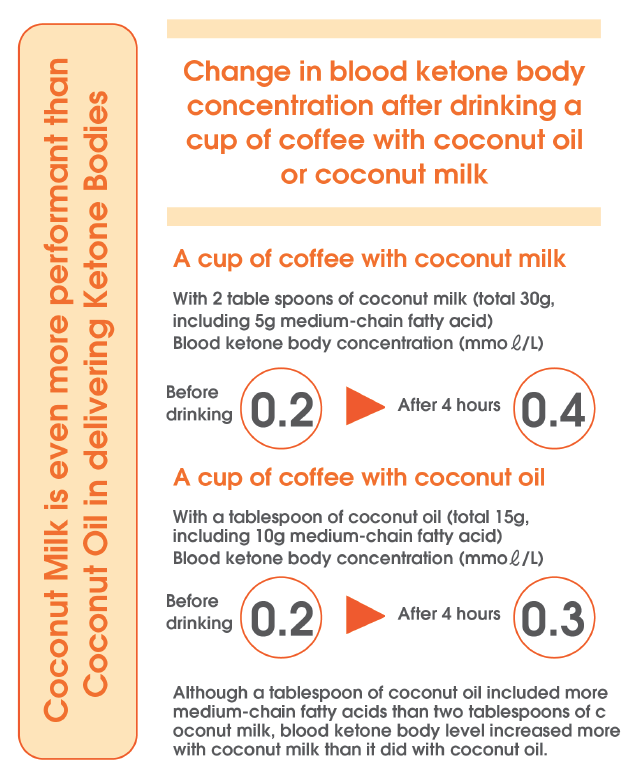 In another test, I compared drinking coffee with coconut oil and coffee with coconut milk. In both drinks, the coffee base was the same. But in one cup of coffee, I added 2 tablespoons of coconut milk (30g/5g of medium chain fatty acids) and in the other I added 1 tablespoon of coconut oil (15g/10g of medium chain fatty acids).
In another test, I compared drinking coffee with coconut oil and coffee with coconut milk. In both drinks, the coffee base was the same. But in one cup of coffee, I added 2 tablespoons of coconut milk (30g/5g of medium chain fatty acids) and in the other I added 1 tablespoon of coconut oil (15g/10g of medium chain fatty acids).
The base line was the same, 0.2mmol/L. After 4 hours of drinking the coffee, my ketone levels went up to 0.4 mmol/L in the case of coconut milk coffee, and only 0.3 mmol/L in the case of coconut oil coffee.
This experiment shows that coconut milk is actually even more effective than coconut oil in raising the ketone levels.
Another advantage of the coconut milk over coconut oil is the calorie count.
100g of coconut oil contains 900kcal while 100g of coconut milk contains only 245kcal.
As you can see, there is a better result from coconut milk, especially if you want to lose weight fast.
"All above text are direct quotes from Prof. Shirasawa book and they are presented here for information about the latest findings about coconut benefits. These information can not be seen as a recommendation to modify or alter a medical treatment. Like any other good food ingredient, coconut can bring benefits only within a proper balanced diet and regular physical exercises."
Reference: FOOD FOR THE BRAIN - PROF. SHIRASAWA’S READINGS
 COCONUT OIL & WEIGHT LOSS
COCONUT OIL & WEIGHT LOSS
Extracts from the book "FOOD FOR THE BRAIN, by Prof. Shirasawa, PHD, MD, anti-aging specialist. ISBN 978-967-14205-0-8"
If you are looking just to lose abdominal fat, you will be thrilled!
A recent study showed women who consumed daily virgin coconut oil, lost fat in their belly.
 A 1986 study by T. B. Seaton et al in the American Journal of Clinical Nutrition that showed people who ate meals containing medium-chain fatty acids increased their metabolic rate an average of 12%, compared to only 4% in those eating meals with long-chain fatty acids. This helps prove the theory that the body uses virgin coconut oil for energy and does not store it as fat thus promoting weight loss.10
A 1986 study by T. B. Seaton et al in the American Journal of Clinical Nutrition that showed people who ate meals containing medium-chain fatty acids increased their metabolic rate an average of 12%, compared to only 4% in those eating meals with long-chain fatty acids. This helps prove the theory that the body uses virgin coconut oil for energy and does not store it as fat thus promoting weight loss.10
10 Seaton, T.B., Welle, S. L., Warenko, M. K., Campbell, R. G. (1986) Thermic effect of medium-chain and long-chain triglycerides in man. Retrieved from http://www.ncbi.nlm.nih.gov/pubmed/3532757
"All above text are direct quotes from Prof. Shirasawa book and they are presented here for information about the latest findings about coconut benefits. These information can not be seen as a recommendation to modify or alter a medical treatment. Like any other good food ingredient, coconut can bring benefits only within a proper balanced diet and regular physical exercises."
Reference: FOOD FOR THE BRAIN - PROF. SHIRASAWA’S READINGS























